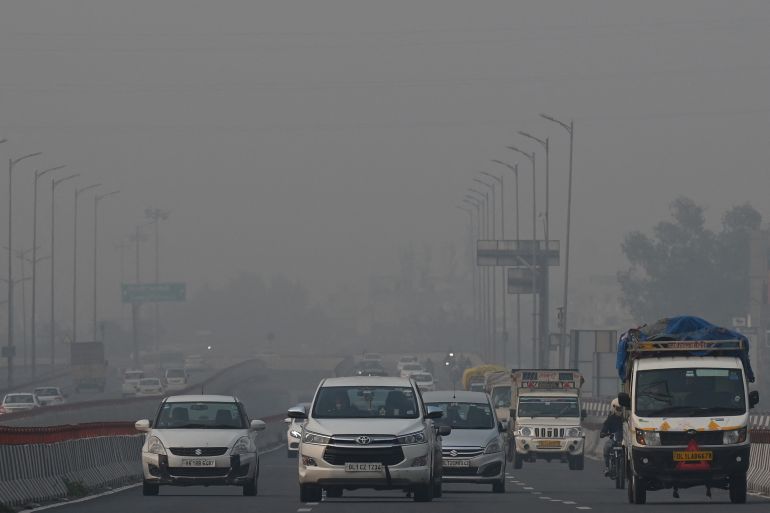India court orders ‘work from home’ over pollution in capital
The order comes after authorities in Delhi shut schools as they struggled to reduce hazardous air pollution in the capital region.

India’s Supreme Court has told authorities to shut offices in the capital and nearby cities, allowing millions to work from home as officials seek ways to reduce hazardous air pollution that led to the closure of schools.
Its order on Monday came after city authorities in New Delhi, which has been battling a toxic haze since early November, took emergency measures on Saturday, ordering the closure of schools and halting building work for four days.
Keep reading
list of 4 itemsCanada wildfires spur evacuation orders, warnings: What you need to know
Evacuation orders issued as wildfire grows near Canada’s Alberta oil patch
‘Unbearable’: Will 45C heatwaves affect who India chooses in election?
“We direct the centre and states of the national capital region to impose work from home for the meantime,” said Chief Justice NV Ramana, head of a panel of three judges considering a petition by a city resident.
The Air Quality Index (AQI) stood at 343 on a scale of 500 in Delhi on Monday, a sign of “very poor” conditions that can cause respiratory illness on prolonged exposure. The capital experienced severe conditions late last week as temperatures dropped and the index reached 499.
The AQI surged to 451 on a scale of 500 in the wake of Hindu festival of Diwali in the first week of this month, during which firecrackers were burned across India.
The AQI measures the concentration of poisonous particulate matter PM2.5 in a cubic metre of air. Anything above 100 is considered unhealthy.
Avikal Somvanshi, Programme Manager of Clean Air Campaign at New Delhi’s Center for Science and Environment, told Al Jazeera that a lockdown might help as vehicles contribute to 15 percent of Delhi’s air pollution.
“It’s an emergency action. But you need a long term, year-long plan to cut down emissions coming from all the sources so there is not enough material, ingredients in the air during this time for this to happen,” he said.
Karthik Ganesan, a fellow at Council on Energy, Environment and Water (CEEW) in New Delhi, backed the court order.
But he called for implementation of measures aimed at reducing private transport use such as “congestion pricing, taxing certain kinds of vehicles/fuels with an eye on pollution emissions, and improving the quality of public transport.”
Airborne PM2.5
Airborne PM2.5, which are less than 2.5 microns in diametre and can be carried deep into the lungs, can cause cardiovascular and respiratory diseases such as lung cancer.
The court also sought urgent steps to rein in crop waste fires in the neighbouring states of Haryana, Punjab and Uttar Pradesh, set by hundreds of thousands of farmers looking to clear fields for a new sowing season.
India’s efforts to reduce the burning of crop waste, a major source of air pollution during winter, have had little benefit, despite its expenditure of billions of rupees over the past four years.
“We want action on the issue,” said Justice Surya Kant. Although the court did not set a deadline for the action by authorities, it will next take up the pollution issue on Wednesday.
The Supreme Court also ordered measures to halt non-essential vehicle traffic, cut industrial pollution and limit dust.
Contributors to the poor air quality in Delhi, often ranked the world’s most polluted capital, include coal-fired plants outside the city as well as the burning of garbage in the open.
Authorities in Delhi however, pushed back against the call to declare a “pollution lockdown”.
In a submission to the top court on Monday, the city government said that such a step would only be “meaningful” if states surrounding Delhi are also included.
“Given Delhi’s compact size, a lock down would have limited impact on the air quality regime,” the Delhi government said.